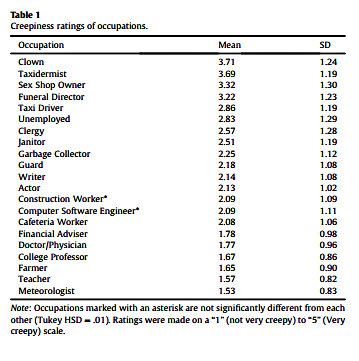Everyone in the death business knows what normal people think of them. They are reminded of it every time they’re asked what they do for a living. I often lie. Perhaps you do, too, sometimes.
A freshly published academic study titled On The Nature Of Creepiness offers us, perhaps, some insights into this unflattering characteristic commonly ascribed to deathworkers – alongside avarice, weirdness, morbidity, shiftiness, cunning, lizard complexion, predation, formaldehyde breath, yellow fingernails, hollow chuckling, inability to meet your eye, etc.
If deathworkers absorb the lessons of this study they may be able in some way to mitigate the adverse esteem in which they are held. It’s called image management.
Here are the headline findings of the study:
1) The perception of creepiness is a response to the ambiguity of threat. Males are more physically threatening to people of both sexes than are females
2) We are placed on our guard by people who are drawn to occupations that reflect a fascination with death or unusual sexual behavior. People who have hobbies that involve collecting things that we are predisposed as a species to fear such as spiders and snakes or things that can only be acquired after something has died (e.g., skulls or bodies to be stuffed) seem creepy to us as well.
3) We do not necessarily assume ill intentions from people who are creepy, although we may still worry that they are dangerous.
I was going to conclude that I have met very few people in the death trade who I’d regard as being remotely until I read this: Most of our subjects believed that creepy people cannot change, and only a small minority of our subjects (8.6%) believed that creepy people are aware that they are creepy.



Charles, we often find that people look at us in a slightly different manner when we tell them that we work within the funereal industry. I’m not sure what they think it is that we do – perhaps hang out in graveyards after dark! I’ve always thought that people working within our industry perform a fundamentally vital role at what is a very difficult and emotionally charged time in people’s lives. Of course, I suppose cinematic and even comedic portrayal of funeral directors doesn’t help to allay people’s perceptions!